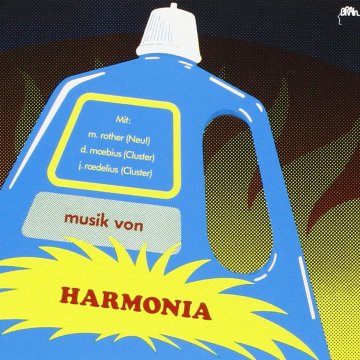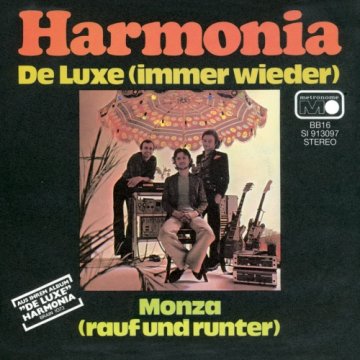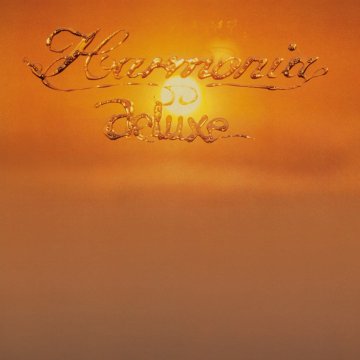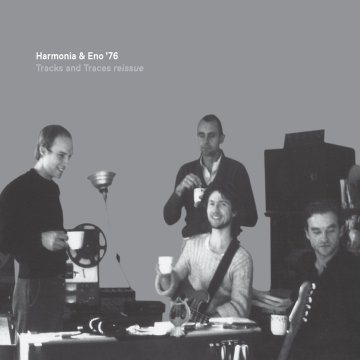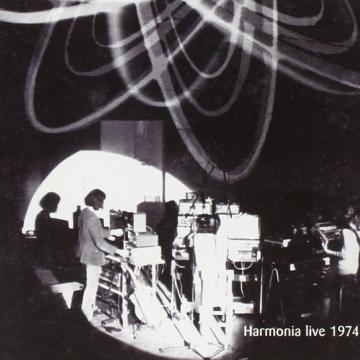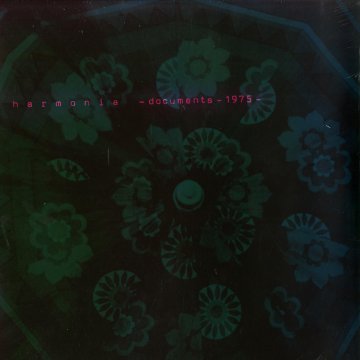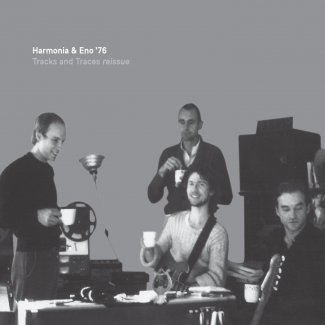
Harmonia 76 - Tracks & Traces
Between 1973-75, Harmonia released just two albums. It was little more than a temporary workspace for three individuals – Dieter Moebius, Hans-Joachim Roedelius and Michael Rother – with different temperaments and musical goals. The band’s name was “a little joke” about their ongoing struggle to achieve harmony. They sold hardly an album in their original lifetime. Three decades later, the trio reunited and now tours worldwide to ecstatic audiences. CD reissues outsell the original vinyl LPs several times over.
Why?
because of the music
because of the magic it makes
because of Rother’s endless guitar lines, the journeys they take us on
because of Roedelius’ lo-fi keyboards and the radiant and dizzy and life-affirming patterns they make
because Moebius’ synthesisers keep it nice and strange with his affection for unpredictable machine motion and quirky automata
because the three circled and complemented and counterpointed each other to unravel rock music into bracing new shapes and sounds
because Harmonia is both music and myth
because when Brian Eno was quoted as calling Harmonia “the world’s most important rock group” and jammed with them in 1976 for a third album (that would only find release 21 years later as Tracks and Traces), he helped to elevate this unknown, unpredictable, unmarketable band to mythical status
because like a shouty archaeologist with a megaphone, Julian Cope’s Krautrocksampler rescued the myth from the obscurity of dusty and musty second hand record shops
because Cope wrote as a fan, getting some facts wrong, in that pre-internet age when facts where hard to come by but, much more importantly, getting to the heart of what made the group so special – the vast kosmische dronescapes and adrenaline-rush rhythms and twinkling electro-melodies
because he set it down in heady proto-punk prose-poetry that you couldn’t fail to be inspired by
because thousands now buy the albums in order to experience ‘it’
because ‘it’ = that life-transforming spirit of discovery in the late sixties and early seventies that fused rock with experimental music
because we who weren’t there when it happened want to go back to the Ur-source and sup from the well
because of the music
because of the magic it makes
because if the universe is a kind of electrical circuit of primal energies, of atoms, molecules, splitting, fusing, reacting, pulsing and metamorphosing into new creations, then why shouldn’t rock music be like that too?
because Moebius, Roedelius and Rother knew that West Germany was not the fifty-first state of the USA
because even if millions of dollars of American post-War investment, imported radio shows and vinyl LPs led many West German bands to copy these sounds as a short cut to fame, Harmonia wasn’t persuaded
because rock music has an endless capacity for reinvention
because to be truly authentic, each new rock genre must be rooted in the soil, concrete, people, sweat, fear and aspirations of where it comes from, not merely ape what has gone before and someplace else
because Rother found his authentic voice by imitating the Beatles, Kinks and Hendrix and then deconstructing them into his own stripped down motorik anthems to West Germany’s endless autobahns, distant horizons and sehnsucht (the longing that is never appeased)
because Moebius and Roedelius found theirs by tapping into West Berlin’s home grown avant garde scene – in the slipstream of Joseph Beuys, West Deutscher Rundfunk, Karlheinz Stockhausen – and channelling it through electric guitar, organ, feedback and buzzing amplifiers
because in 1973, when the white heat of the underground got too much, Cluster’s Moebius and Roedelius had a dream
because in this dream they went to the woods, or to be more precise, the rural hamlet of Forst in the almost deserted valley of Weserbergland, 175 km south west of Hamburg, at the bend of the river Weser
because in deep in the woods they left you alone
because there you could be self-sufficient
because Rother took a sabbatical from his band Neu! to join Cluster at Forst
because they stumbled across a common purpose and hit their stride
because there followed Musik von Harmonia, one of the all time great debut albums, because it comes out of nowhere, whole and dramatic and totally itself, and then there was the more structured, rock-orientated, yet still utterly fresh Deluxe, one of the greatest second albums of all time
because something whispered in Brian Eno’s ear that Harmonia was the new ‘it’, and he couldn’t help but agree
because in 1974 Eno flew to Hamburg to see Harmonia live at the Fabrik, sat in the front row and then joined them on stage
because the band invited Eno to join them at Forst and he said ‘yes’
because of the music
because of the magic it makes
because when the invite was eventually fulfilled two years later Harmonia had by then all but disbanded
because Rother peeled away to find his solo voice with Flammende Herzen, just as Roedelius did with Durch Die Wuste while Moebius conducted the Liliental supersession
because these solo projects fed into Harmonia, and vice versa
because Eno’s visit was a call to do ‘it’ one more time
because the invitation was to experience Forst itself, rather than explicitly to record an album as music industry product
because life at Forst was cooking, strolling, chopping wood, mushroom and fruit picking, heating the stove, cranking up the power generator, listening to the whispering of the wind, and then perhaps making some music
because if life is not worth living, music is not worth making
because in their eleven days at Forst, Harmonia and Eno improvised live in the studio, as if they knew their time together was going to be short and fleeting, as if they sensed that they might just be able make something beautiful
because a lack of time is the mother of invention
because Tracks and Traces is sublime visitations and nearly-finished sketches and sideways glances and wind-borne seeds for future albums
because the lovely sun-dapped Welcome is a moment that can never be recaptured
because you couldn't perform this in exactly the same way twice
because the neo-dub-bass-pulse-ghostly-shriek of Atmosphere doesn't so much go nowhere as come from nowhere
because you couldn't pre-compose this music
because of Vamos Companeros, the proto-U2, neon-lit gridlock crunch of multi-tracked guitars, chattering synths, heavy drum machines, sinister and dark
because without darkness there is no light
because By the Riverside glides softly into the music-that-doesn’t-demand-attention-but-rewards-it ethos that Eno would soon call ambient; a weirdly sensuous inertia, a shimmering heat-haze bass motif, metallic bird chirrups, glimpses of sublime melody
because there’s movement in stillness
because while Eno chants “Don’t get lost on Luneberg Heath”, that melancholy organ’s varispeeded pulse, buzz, squeak and whistle draws you in closer and still closer, like a moth to a flame
because it takes us out of the comfort zone
because in his childhood in Pakistan, Rother discovered Indian and Arabian music and the idea of endless music, as you can hear in the ticking guitar that soars like a migrating bird over the vast 15-minute Sometimes in Autumn while synth strings heave like ocean currents, industrial sounds hiss, clank and buzz, where things mutate and decay and nothing is constant except Rother’s endless guitar
because it transports us to new places
because of the amorphous Weird Dream and how Moebius punctuates it with his ravishingly strange Morse code of pops, clicks, thuds, scrapes and whooshes
because when the dream fades, the ambience lingers
because of Almost, and Eno’s gift for Zen simplicity, translucent shavings of guitar and piano circulate each other, a deep love of melody
because of the freshness, even at the occasional risk of vagueness
because Roedelius is a descendent of preachers and teachers who is weaving his ancestral voices into new shapes and sounds (check out Les Demoiselles as it jump cuts to a hilarious paint-by-numbers Baroque waltz for the machine age; tradition lost, tradition rebirthed)
because they’re not afraid to be sensuous or sincere or silly
because of the achingly beautiful (and distressingly short) cameos of When Shade Was Born and Trace
because in Eno’s words: “There we were stuck by the river Weser, and the music seemed to flow as easily as it did”
because Aubade lingers like it doesn't want to say goodbye
because David Bowie then summoned Eno to Montreal and begin work on the Low sessions and it was time to say goodbye
because by refusing written music and always improvising, Harmonia give us the sense that we the listeners are party to the act of creation, that on each track we are hearing how, from the simplest of materials, a whole new sound painting is born; unfamiliar chord progressions, sublimely beautiful tunes, East-meets-West ambiences
because minus any overdubs with only minimal post-production to clean the tapes, Tracks and Traces is an authentic document of that act of creation
because albums taped fast and haphazardly exude a rate of discovery and an emotional tempo that matches that of the listener
because of Harmonia’s ineffable curiosity and risk-taking and invention and wonder and love and sorrow and vitality and inertia and humor that keeps breaking through to touch us
because of the music
because of the magic it makes
This text forms the sleeve notes to the Groenland label's re-issue of Tracks and Traces.
